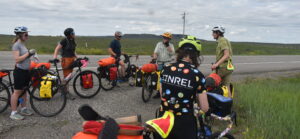
Pack up, gear up, and a quick bicycle check up: the group got ready to leave. It was the first day on our bikes, from one ranch to the next. A short and mildly adventurous route sprinkled with some improvisational backtracking and construction zone maneuvers, we got the first feel of our weighted bikes. Supplied with some decent weather, probably too much tuna, and a few “rally pickles,” we made our way to the Charter Ranch, maintained by Steve Charter, his family, and apprentice. We were welcomed by a long gravel driveway, a few sheepdogs, and eventually the man himself.
Settling down, sitting down, and getting down to business, we began listening to Steve inform us of his history on the ranch. Built into the side of a small hill, his house was chock full of interesting features: exterior insulation, composting toilets, and only southern facing windows. Beyond his earth shelter/passive solar house’s qualities, we were also acquainted with his ongoing battle against the nearby coal mine. This coal company eventually got a permit to mine, based on environmental laws and agency decisions, with the agreement that they let coal and agriculture co-exist. I’ll let you imagine how that turned out.
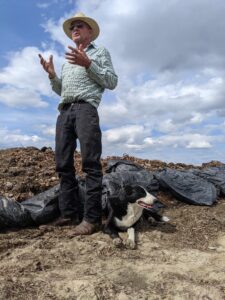
Heading on to Steve Charter’s “lawn”, he switched up the pace and we were informed of his experimentalist approach to regenerative agriculture. Using vermicast to jumpstart the mycorrhizal fungi and plant relationship (I’m still at square one for understanding what this means), he showed us some of his trials to get soil back to the state it was in during the times of pre-industrialized agriculture. Steve would show us all this rancher wizardry and then go on to say, “I’m not very smart, I’ve just been doing this a while.” Upon hearing his humble understanding of the work he does, I could tell that the cornucopia of unique lived experiences he had contributed flavorfully to his unique worldview.
A tad more meandering and we found ourselves out in one small fraction of Steve’s livestock grazing grounds. He spoke of the grass and weeds (or lack thereof) as well as some of the issues he encounters, such as the expansion of the prairie dog territory. These prairie dogs were overgrazing and creating their mounds further into his property. But, do you know what he said? Despite being unhappy with their destruction, he wished he had seen their environment in Lewis and Clark’s times, just to know how they benefited the landscape before modern agriculturalists got involved. Steve knew these creatures were a part of the ecosystem just as he and his cattle were, so he was looking for a way they could all co-exist.
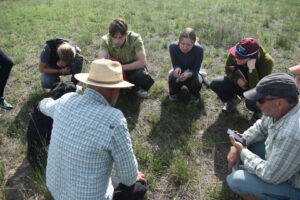
While we’re learning a lot about energy’s effect on climate and climate’s effect on the earth on this course, we are also finding that cohesive and respectful communication is the key to creating understandings between those who don’t have a full grasp on what’s at stake. Steve’s “everything has a purpose” mindset coupled with his innate desire to experiment on his ranch left me with a new way to approach conservation. Incorporating others’ views as the foundation for common ground – rather than using them as opportunities to overwrite their beliefs or to try different angles of attack for your own perspective to win out – can really help with furthering an understanding between people.
From what I learned of Steve in the short period we met him, I’m certain he could find a mutually beneficial way to exist with those prairie dogs had he been able to talk to them. He had a way of making you believe he’d Macgyver his way out of any predicament. Fortunately for us, our problems tend to be a lot more anthropomorphic. We get to communicate with people we may or may not agree with. Rather than human-to-prairie dog communication, at least human-to-human communication is translatable. I believe that using respect, coupled with some verbal experimentalism, can be a fruitful combo for always building a mutual appreciation of each other.
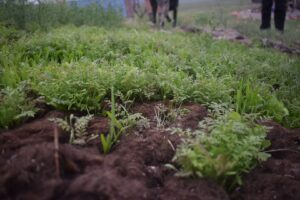
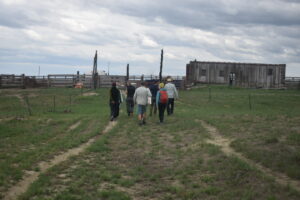
One Reply to “Finding Common Ground with Prairie Dogs by Wyatt Slack”
Comments are closed.
Outstanding! This young man certainly benefited from an incredible experience and what he took from it should make us so proud of him. We need more like him and I wish the best for him.